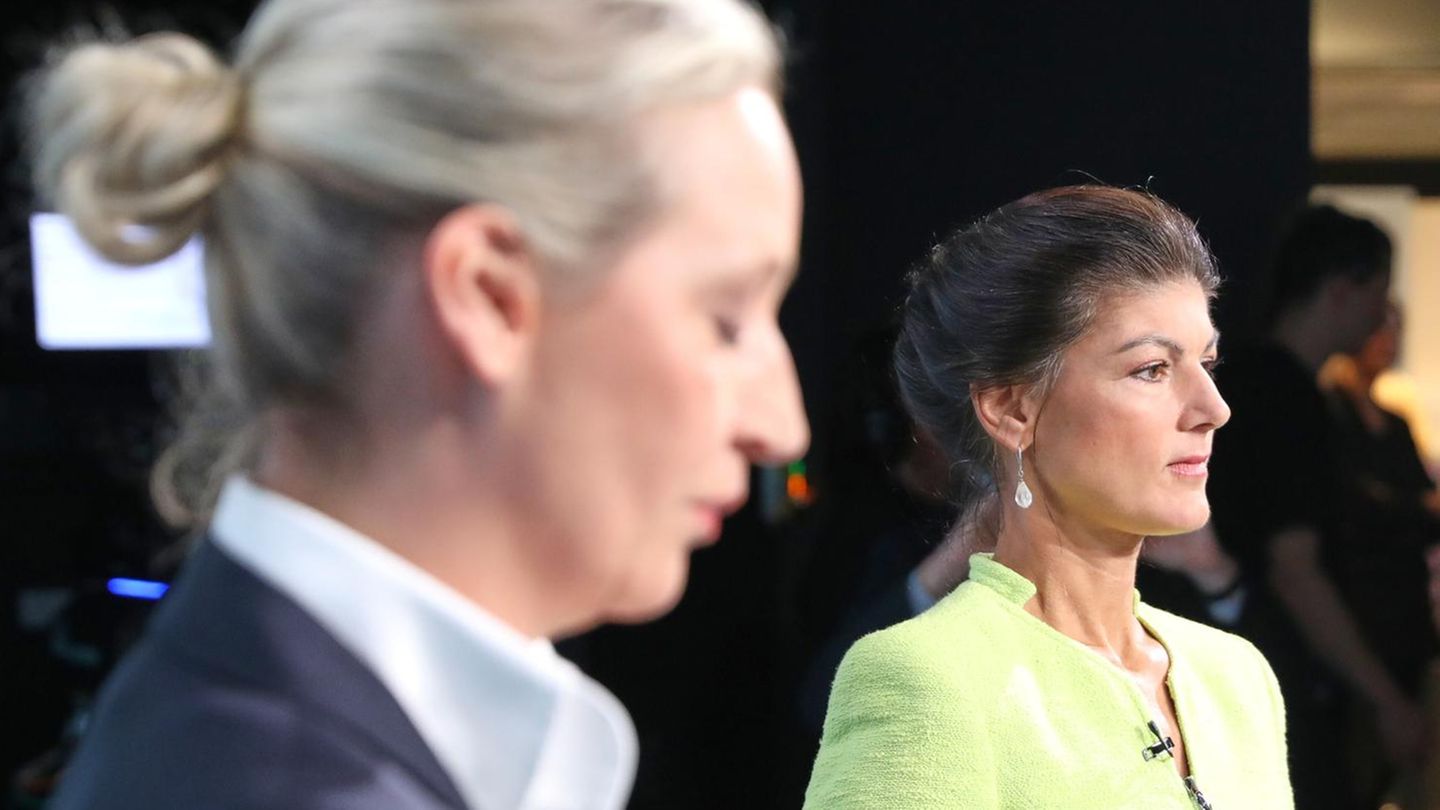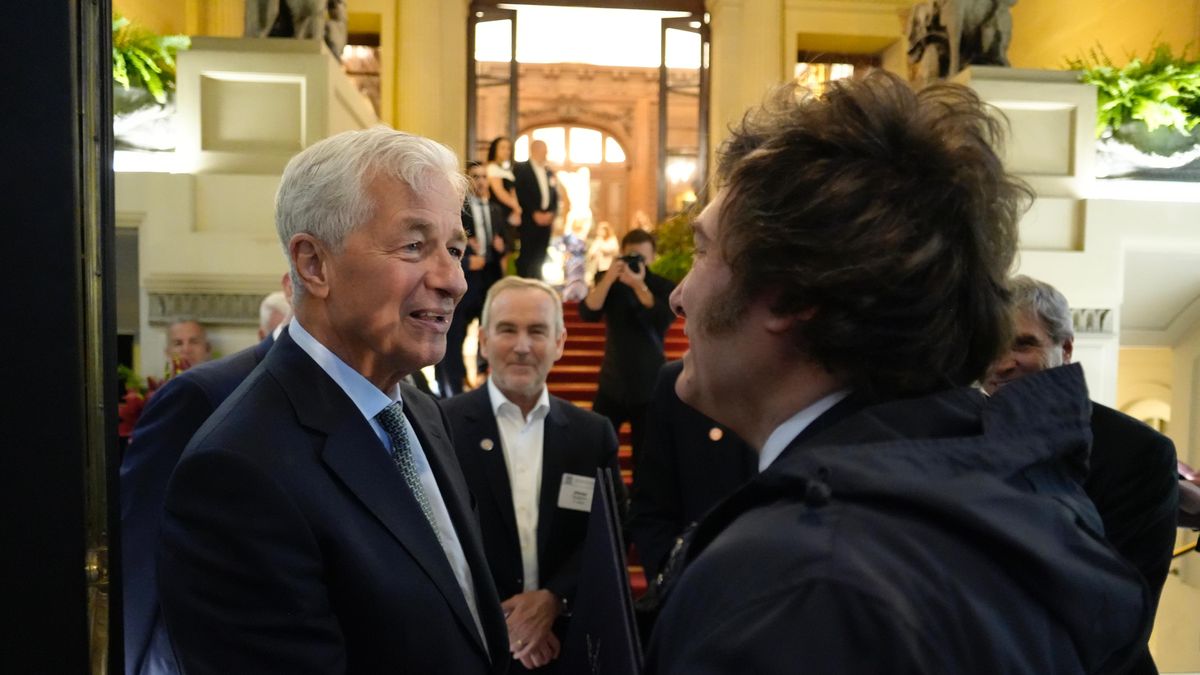New study
Wagenknecht cost the AfD more votes than expected
Copy the current link
The Sahra-Wagenknecht party had a greater influence on potential AfD voters than previously known. The success of the BSW depends above all on the war against Ukraine.
Sahra Wagenknecht had clearly formulated the goal: her new party should be one for all those who vote for the AfD “out of anger or desperation,” “but not because they are right-wing.” This is what she said shortly before founding the party named after her. “We are the alternative to the alternative,” the Thuringian state chairwoman Katja Wolf later assisted.
Political scientists, pollsters and the political competition also assumed that the BSW could at least weaken the AfD. The picture that emerged on the evening of the European elections was all the more astonishing. Although the BSW went from zero to 6.2 percent and reached double digits in East Germany, the AfD moved up by almost five percentage points to 15.9 percent – and thus into second place behind the Union.
According to the analysis of voter migration by the polling institute Infratest-Dimap, the new party had hardly robbed the AfD. Instead, more than a fifth of BSW voters came from the SPD, closely followed by the Left Party.
This was repeated in a similar way in the state elections in the fall. Now it was said that Wagenknecht was not weakening the AfD, but the center.
But a new study shows: The influence of the BSW is greater than it previously seemed. It will soon appear in the specialist journal “Research & Politics” and is the star before.
In contrast to Infratest-Dimap, the political scientists Constantin Wurthmann, Sarah Wagner and Leon Heckmann not only used previous election results and post-election surveys, but also data from the German Longitudinal Election Study (GLES). The long-term survey is carried out at irregular intervals and records the political attitudes and voting intentions of the participants.
The team compared the GLES results from October 2023, when the BSW did not yet exist, with the data after the European elections. And see: At that time, a large proportion of the later BSW voters actually still intended to vote for AfD.
Sahra Wagenknecht and the war of aggression against Ukraine
If you use these numbers as a basis, the AfD is actually in the lead when it comes to voter migration towards BSW, together with the Left. Only then do the Union and the SPD come – and at some distance the Greens and the FDP. The influx from the AfD is often former SPD, Left and FDP supporters who have since leaned towards the AfD.
There is one issue in particular that is driving the popularity of the Wagenknecht party: the attitude to the Russian war of aggression in Ukraine. The authors write that the rejection of German support for Ukraine was by far the decisive factor in bringing people to the BSW.
Accordingly, former SPD supporters who ultimately voted for the BSW are significantly more critical of aid to Ukraine than other people who voted for the SPD in 2021. This is most evident among those who have even turned to the AfD in the meantime. They also reject migration more strongly. A Ukraine effect can also be seen among people who have “renounced” the Union.
The AfD’s upswing could probably be slowed down
Co-author Sarah Wagner says the BSW has closed a representation gap for many people by combining criticism of migration with center-left economic policy. BSW voters who came from the left, for example, were more critical of migration than left-wing voters. However, that would not be enough for the party’s success.
It needed personalization to the popular but also polarizing Sahra Wagenknecht. “And,” says Wagner, “the main topic needed was Ukraine policy.” The party now cares about the issue “almost as strongly” as the Greens do about the climate and the AfD migration. “Hardly any other party can come close now.”
This is also why we experienced “a relevant outflow of people away from the AfD” during the European elections. For these people, the BSW is “actually an ‘alternative to the alternative’”. At the same time, Wagner restricts: AfD regular voters were hardly or not at all mobilized by the BSW. “Even Sahra Wagenknecht doesn’t reach that – despite her popularity.”
BSW wants to accommodate Russia
BSW and AfD have recently attacked each other more sharply. From the ranks of the AfD it is said that the BSW is only the “latest old party” because it is now in coalition with the CDU and SPD in Thuringia and Brandenburg.
Sahra Wagenknecht, in turn, attacks the AfD for its economic policy. AfD leading candidate Alice Weidel stands for “elbow capitalism” à la Margaret Thatcher, said Wagenknecht at the end of December.
Your Secretary General Christian Leye is not surprised by the new data. “This is consistent with our internal analyses,” said Leye star. Unlike the AfD, the BSW is “consistent on the peace issue”.
Sahra Wagenknecht speaks of a “proxy war” in Ukraine
What this means is shown in the draft of its election program, which the BSW wants to decide on at a party conference on Sunday. What is called for is a “ceasefire without preconditions” between Ukraine and Russia, an end to arms deliveries and negotiations with Russia about restarting the Nord Stream gas pipeline.
Instead of a war of aggression that violates international law, there is talk of a “proxy war” and, more generally, of Russia “defending itself against Western military installations in its periphery.”
A majority of Germans reject arms deliveries to Ukraine, said Leye. “The BSW represents this majority – the other established parties do not.” However, surveys sometimes provide contradictory results on this question.
SPD hopes for a repeat of 2021 with its Ukraine policy
And the SPD? Secretary General Matthias Miersch is combative. “The voter migration shows how volatile elections have become,” he told the star. In 2021, the SPD in particular would have benefited and won the federal election “against all polls”.
This should now succeed a second time with Olaf Scholz. The Chancellor is betting on the Ukraine card, or more precisely: his rejection of the delivery of the Taurus cruise missile to Ukraine. He also accuses supporters such as Union candidate Friedrich Merz of “Russian roulette”.
No problem for Miersch. The SPD takes people’s concerns seriously – when it comes to Ukraine policy as well as migration and the economy. “Anyone who looks for a politics of division will be disappointed.”
And yet: In current surveys, the AfD is at 18 to 20 percent, ahead of the SPD, which only has 14 to 17 percent. The BSW has recently lost support and has to worry about entering the Bundestag at four to seven percent.
For political scientist Wagner, however, a lot is still in motion. “In any case, the current surveys come too early for a real trend,” she says.
Source: Stern
I have been working in the news industry for over 6 years, first as a reporter and now as an editor. I have covered politics extensively, and my work has appeared in major newspapers and online news outlets around the world. In addition to my writing, I also contribute regularly to 24 Hours World.







